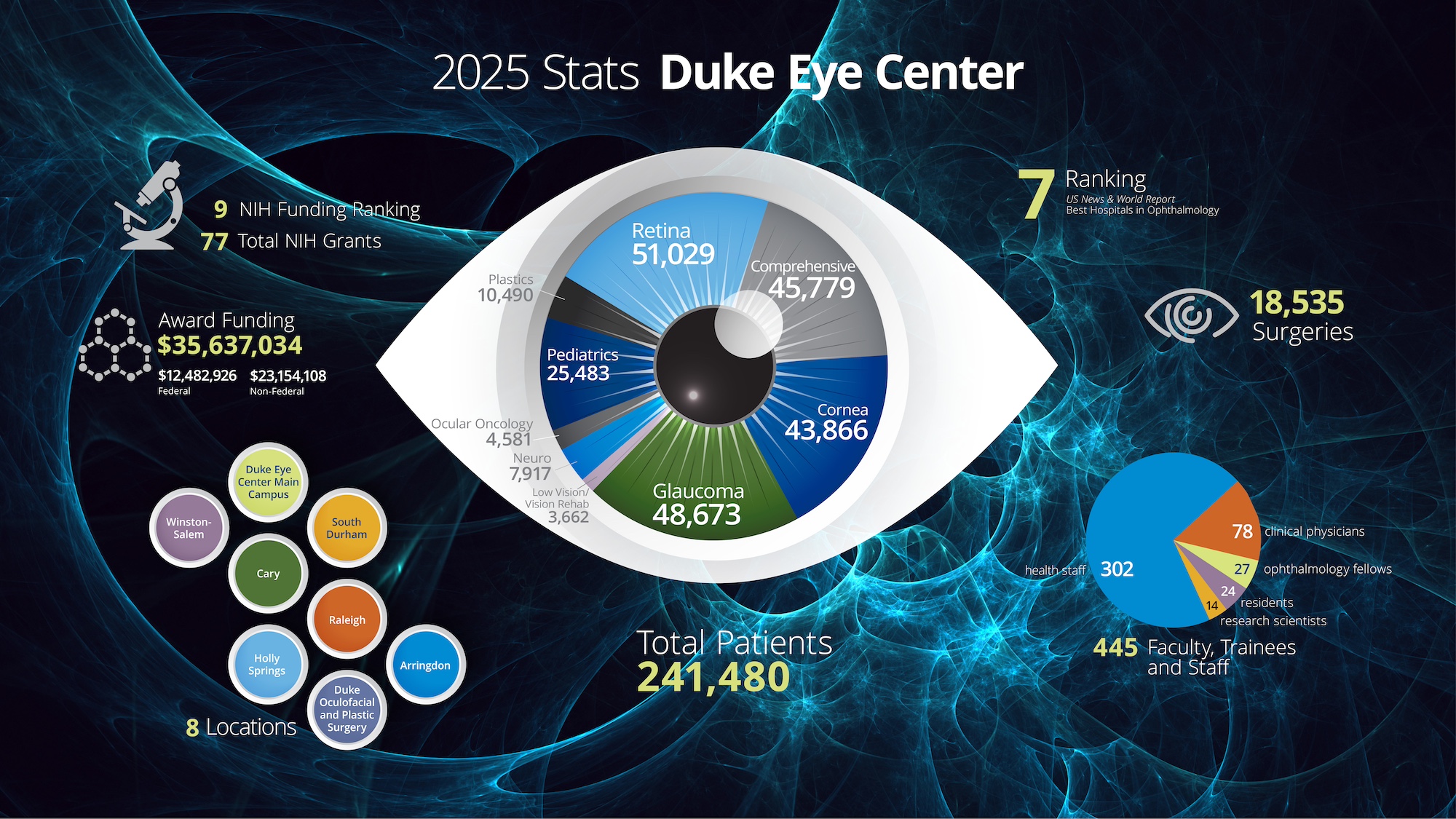Duke Eye Center is an internationally-renowned academic medical institution dedicated to curing eye disease worldwide though excellence in research, education, and patient care. Specializing in all areas of ophthalmology, it is a top ranked program by the U.S. News & World Report Best Hospitals survey since the survey began over 30 years ago.

We are proud to be the home of many pioneers and centers of excellence in ophthalmology. Some highlights include:
- The Division of Ocular Oncology was established in 2023 with the addition of a new Duke fellowship trained ocular oncologist.
- The first treatment for geographic atrophy was FDA-approved in February 2023 with Duke being a clinical trial site and clinical trails led by Duke Faculty.
- The recently established Foster Center for Ocular Immunology is the world’s first university-based center of its kind – dedicated to the evaluation, diagnosis and treatment of patients with uveitis and other inflammatory eye diseases. The center will also focus on research that uncovers new understanding of the basic mechanisms of inflammation in and around the eye with the goal to translate the knowledge into effective treatments.
- The Center for Ophthalmic Genetics is on the forefront of a number of innovative treatments and is conducting ground breaking research focused on gene therapy and other neuroprotective strategies with the potential to transform lives.
- From bench to bedside is an accurate description of our research efforts. In 2018, Rhopressa® the first treatment for glaucoma in 20 years was approved by the FDA based on basic research conducted at Duke Eye Center. Our faculty also were a part of the investigative team that helped prove Humira is an effective treatment for uveitis.
- Duke is home of the world’s leading optical coherence tomography (OCT) research program. Over the last quarter century, OCT has revolutionized patient care and developed in amazing ways – and team of ophthalmologists and biomedical engineers at Duke are responsible for much of that development.
- The Duke Pediatric Retina and Optic Nerve Center (DPROC) is a unique multidisciplinary program is dedicated to helping infants and children improve eye and brain health.
We offer a robust educational program that includes, medical student education, residency and fellowship programs in all specialties, as well as a recently established optometry residency in pediatrics. We offer a host of continuing education programs for ophthalmology colleagues and referring providers.
Our faculty hold leadership positions for national and international societies and have been recipients of some of the highest honors in the field.
Duke Eye Center is on the forefront of patient care. The Hudson Building at Duke Eye Center opened in June 2015 and became the third facility in the Duke Eye Center main-campus complex, adding to the original Wadsworth Building and the Albert Eye Research Institute (AERI), housing the pediatric clinic and research facilities. Together, the three facilities comprise 245,000 square feet of clinic and research space. Our main campus facilities are located on the Duke University campus which allows easy collaboration with our colleagues across the university. We have multiple satellite locations with plans to expand over the next several years.
Duke Eye Center is poised to continue our rich history of innovation and translating the best science to new understanding and implementing new treatments for all eye diseases and makes Duke a leader in ophthalmology.
About Duke Health
Duke Health encompasses the world-class academic health care and research of the Duke University Health System, Duke University School of Medicine, Duke University School of Nursing, Duke-NUS Medical School, Duke Global Health Institute, and the Duke-Margolis Institute for Health Policy.
The health system advances our clinical mission by delivering care across four hospitals (Duke University Hospital, Duke Regional Hospital, Duke Raleigh Hospital and Duke Health Lake Norman Hospital) and numerous outpatient locations, including Duke Primary Care, Duke Health Integrated Practices, Duke HomeCare & Hospice and multiple affiliations.
Leading the education and research missions of Duke Health are the School of Medicine and its numerous departments, centers, and institutes; the School of Nursing; Duke-NUS Medical School; Duke Global Health Institute; and the Duke-Margolis Institute for Health Policy.
Through the integration of its education, research, and clinical care missions, Duke Health is steadfast in its dedication to improving the lives of all who come to us for hope, health, and healing. We do so by elevating standards of care; conducting breakthrough research and discovery; teaching and training the next generation of providers; and strengthening global and community health.